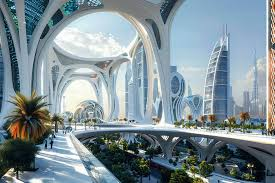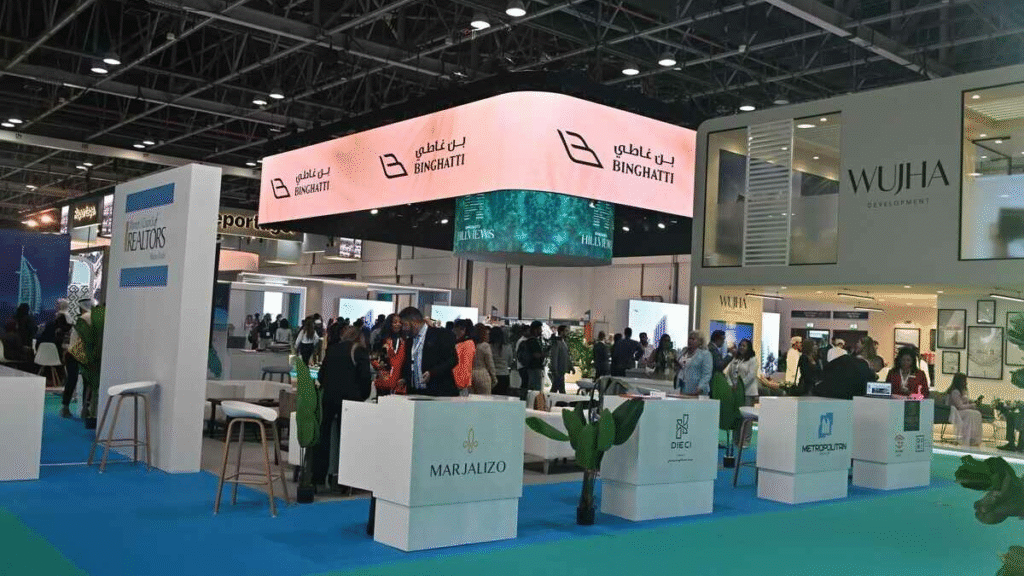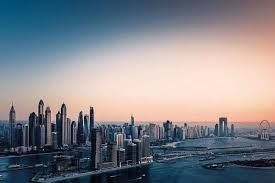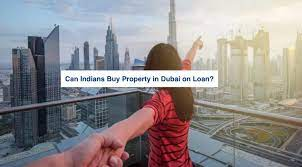
Imagine stepping into your Dubai home, where a soft voice command lifts elegant blinds, revealing a golden sunrise over a tranquil lagoon or a lush community garden. Your coffee brews in a smart, eco-friendly kitchen, and wide windows frame a vibrant wellness plaza or a serene skyline. You start your day with a yoga session in a nearby pavilion, feeling the heartbeat of a city that’s capturing the world’s imagination. It’s August 2025, and Dubai’s property market is a global magnet, with projects like Dubai Hills Estate, Tilal Al Ghaf, and Palm Jumeirah drawing buyers from the UK, India, Russia, and China.
With 96,000 transactions worth $87 billion in the first half, up 15% from 2024, and 55% of buyers from these nations, Dubai shines as a top investment destination. Offering 100% freehold ownership, a dirham pegged to the U.S. dollar, and no personal income tax, capital gains tax, or annual property taxes, properties priced from $500,000 to $10 million deliver 5-7% rental yields and 7-10% price appreciation, outpacing London (2-4%) and New York (2-3%).
Properties over $545,000 qualify for a 10-year Golden Visa, while those at $204,000 grant 2-year residency. Fueled by 25 million tourists and a 4% population surge, Dubai’s market is irresistible. Navigating fees, VAT, and 2025 regulations is your key to securing a radiant investment in this dynamic city.
Dubai’s tax-free environment is a major draw for global buyers in 2025, offering unmatched financial benefits. With no personal income tax, a $1 million Dubai Hills Estate apartment yields $50,000-$70,000 annually, tax-free, saving $18,500-$31,500 compared to the U.S. (37%) or UK (45%). Selling a $1 million home for $1.1 million (10% appreciation) nets a $100,000 tax-free profit, saving $20,000-$28,000 versus London (20-28%) or New York (20-37%).
No property taxes save $5,000-$100,000 yearly on $500,000-$10 million properties, unlike London’s council tax (up to 2%) or New York’s property tax (1-2%). Residential purchases skip 5% VAT ($25,000-$500,000), making Dubai a haven for buyers from GCC, Europe, and Asia seeking high returns without tax burdens.
Tax-free benefits feel like a refreshing wave of financial freedom for global buyers.
Dubai’s Golden Visa program, offering 10-year residency for properties over $545,000, is a 2025 magnet for global buyers. A $1 million Tilal Al Ghaf villa qualifies, providing family sponsorship and business setup perks. Smaller properties at $204,000 offer 2-year residency, appealing to entry-level investors from India and China. With 7-10% price growth and 85-95% occupancy, this program drives demand, unlike stricter residency rules in other markets. The visa’s flexibility attracts UK and Russian buyers seeking long-term stability, making Dubai a top choice for 2025.
The Golden Visa feels like a golden key unlocking a radiant future.
Wellness-focused communities like Dubai Hills Estate and The Sustainable City are a 2025 trend, drawing buyers with yoga pavilions, mindfulness gardens, and fitness trails. Priced at $500,000-$3 million, Dubai Hills Estate yields $25,000-$150,000 annually, tax-free, with 85-90% occupancy driven by wellness amenities. These features resonate with European and GCC buyers prioritizing health and lifestyle. With 7-10% price growth, Dubai outpaces less wellness-focused markets, offering a vibrant living experience that enhances its global appeal.
Wellness communities feel like a vibrant breath of fresh air for buyers.
Emaar’s Dubai Hills Estate, 10-15 minutes from DIFC, is a 2025 favorite with villas and apartments featuring biophilic designs, smart air purifiers, and wellness parks. Priced at $500,000-$3 million, these properties yield $25,000-$150,000 annually, tax-free, saving $9,250-$67,500. Selling a $1 million home for $1.1 million nets a $100,000 tax-free profit, saving $20,000-$28,000. No property taxes save $5,000-$30,000 yearly, and VAT exemptions save $25,000-$150,000. With 7-10% price growth and 85-90% occupancy, this project attracts GCC and UK buyers, blending urban luxury with high returns.
Dubai Hills Estate feels like a radiant, urban sanctuary for global wealth.
Majid Al Futtaim’s Tilal Al Ghaf, 20 minutes from Dubai Marina, unveils a 2025 phase of smart villas with AI-driven climate control and lagoon-side wellness hubs. Priced at $500,000-$5 million, these properties yield $25,000-$350,000 annually, tax-free, saving $9,250-$157,500. Short-term rentals, boosted by 25 million tourists, require a DTCM license ($408-$816), increasing yields by 10-15% ($2,500-$52,500). Long-term leases need Ejari registration ($54-$136). Non-compliance risks fines up to $13,612. With IoT-enabled fitness zones and 7-10% price growth, this project draws Indian and Russian buyers, cementing its 2025 appeal.
Tilal Al Ghaf feels like a vibrant, smart haven for thriving investments.

Palm Jumeirah, Dubai’s iconic man-made island, remains a 2025 pinnacle with beachfront villas and penthouses featuring private infinity pools and exclusive beach clubs. Priced at $2 million-$10 million, these properties yield $100,000-$500,000 annually, tax-free, saving $37,000-$225,000. Selling a $5 million villa for $5.5 million yields a $500,000 tax-free profit, saving $100,000-$140,000. No property taxes save $20,000-$100,000 yearly, and VAT exemptions save $100,000-$500,000. Maintenance fees ($10,000-$50,000) cover elite amenities, with a 5% municipality fee ($5,000-$25,000) on rentals. With 90-95% occupancy, Palm Jumeirah attracts ultra-high-net buyers from Russia and Europe, reinforcing Dubai’s global allure.
Palm Jumeirah feels like a radiant, iconic oasis for elite wealth.
Dubai’s no personal income tax policy is a 2025 cornerstone, letting buyers keep 100% of rental income. A $500,000 Dubai Hills Estate apartment yields $25,000-$35,000, saving $9,250-$15,750; a $10 million Palm Jumeirah villa yields $400,000-$500,000, saving $180,000-$225,000. Short-term rentals require a DTCM license ($408-$816), boosting yields by 10-15%. Long-term leases need Ejari registration ($54-$136). A 5% municipality fee ($1,250-$25,000) applies, with fines up to $13,612 for non-compliance. High occupancy from luxury and wellness amenities ensures this tax advantage drives Dubai’s global appeal.
Tax-free rentals feel like a refreshing wave of financial prosperity.
Zero capital gains tax lets buyers keep 100% of sale profits, a key 2025 draw. Selling a $1 million Dubai Hills Estate home for $1.1 million yields a $100,000 tax-free profit, saving $20,000-$28,000. A $10 million Palm Jumeirah property sold for $11 million delivers a $1 million tax-free gain, saving $200,000-$280,000. With 7-10% price growth, these projects outperform global markets. A 4% DLD fee ($20,000-$400,000), often split, applies, but tax-free profits make Dubai a wealth-preserving hub for global buyers.
Keeping every dirham feels like a radiant triumph of smart investing.
No annual property taxes save $5,000-$100,000 yearly on $500,000-$10 million properties, unlike London’s council tax ($3,000-$30,000) or New York’s property tax (1-2%). Maintenance fees ($5,000-$50,000) cover wellness hubs, smart security, and luxury amenities, with a 5% municipality fee ($1,250-$25,000) on rentals. High occupancy from features like private pools and fitness trails ensures cost efficiency, attracting global buyers to Dubai’s 2025 market.
No property taxes feel like a gentle breeze easing your investment journey.
Residential purchases skip 5% VAT, saving $25,000-$500,000 on $500,000-$10 million properties. Off-plan purchases incur 5% VAT on developer fees ($2,500-$50,000), recoverable via FTA registration ($500-$1,000). Short-term rental operators register for VAT if revenue exceeds $102,041, charging 5% but claiming credits on DTCM fees ($408-$816). A $500,000 home yielding $25,000-$35,000 incurs $1,250-$1,750 in VAT, with $400-$600 in credits. Non-compliance risks fines up to $13,612, so diligent record-keeping is key for 2025 buyers.
VAT exemptions feel like a clever boost to your financial strategy.

The 4% DLD fee, typically split, applies: $20,000 for a $500,000 home or $400,000 for a $10 million villa. Gift transfers to family reduce DLD to 0.125%, saving $19,375-$387,500. Title deed issuance costs $136-$272, requiring DLD registration. Broker fees (2%, $10,000-$200,000) may be waived for off-plan projects. Mortgage registration (0.25% of loan, $1,250-$25,000) and valuation fees ($680-$1,360) apply for financed deals. The 2025 Oqood system ensures escrow compliance, securing investments for global buyers.
Title deeds feel like the key to your radiant, global wealth.
Introduced in 2023, the 9% corporate tax applies to profits over $102,110. A $500,000 home yielding $25,000-$35,000 incurs no tax. A $10 million villa yielding $400,000-$500,000 incurs $36,000-$45,000, reducing net income to $364,000-$455,000. QFZP status in areas like DMCC avoids this, saving $36,000-$45,000, with setup costs of $2,000-$5,000. Small business relief waives tax for revenues under $816,000 until December 31, 2026. Individual ownership skips this tax, ideal for most 2025 buyers.
Corporate tax feels like a navigable ripple in your investment strategy.
The Domestic Minimum Top-up Tax (DMTT), effective January 1, 2025, imposes a 15% tax on multinationals with revenues over €750 million ($793 million). Individual investors are unaffected, and QFZP status avoids DMTT, saving $7,500-$75,000. Cabinet Decision No. 34 exempts corporate tax for QIFs with real estate income below 10%. A QIF earning $2 million, with $200,000 from rentals, faces 9% tax ($16,200) on 90% ($1.8 million). A July 2025 policy allows depreciation deductions, saving $1,818-$18,182 annually for a $1 million home revalued at $1.1 million. These rules enhance Dubai’s appeal for global buyers.
New tax rules feel like a puzzle with prosperous solutions.
Dubai Hills Estate ($500,000-$3 million) offers 5-7% yields and 7-10% price growth, delivering a 7-10% ROI with yoga studios and co-working hubs. A $1 million home yields $50,000-$70,000 tax-free, saving $18,500-$31,500. Selling for $1.1 million yields a $100,000 tax-free profit. No property taxes save $5,000-$30,000, and VAT exemption saves $25,000-$150,000. Maintenance fees are $5,000-$15,000. QFZP saves $4,500-$6,300. U.S. investors deduct depreciation ($9,091-$27,273), saving up to $9,545.
Dubai Hills Estate feels like a radiant, high-return urban masterpiece.
Tilal Al Ghaf ($500,000-$5 million) offers 5-7% yields and 7-10% price growth, delivering a 7-10% ROI with mindfulness pavilions. A $1 million villa yields $50,000-$70,000 tax-free, saving $18,500-$31,500. Selling for $1.1 million yields a $100,000 tax-free profit. No property taxes save $5,000-$50,000, and VAT exemption saves $25,000-$250,000. Maintenance fees are $5,000-$25,000. QFZP saves $4,500-$6,300. U.S. investors deduct depreciation ($9,091-$45,455), saving up to $15,909.
Tilal Al Ghaf feels like a vibrant, innovative investment haven.
Palm Jumeirah ($2 million-$10 million) offers 5-7% yields and 7-10% price growth, delivering a 7-10% ROI with private pools and beach clubs. A $5 million villa yields $250,000-$350,000 tax-free, saving $92,500-$157,500. Selling for $5.5 million yields a $500,000 tax-free profit. No property taxes save $20,000-$100,000, and VAT exemption saves $100,000-$500,000. Maintenance fees are $10,000-$50,000. QFZP saves $22,500-$31,500. U.S. investors deduct depreciation ($45,455-$90,909), saving up to $31,818.
Palm Jumeirah feels like a radiant, global luxury oasis.
Price Range: Dubai Hills Estate ($500,000-$3 million) and Tilal Al Ghaf ($500,000-$5 million) suit mid-tier to affluent buyers; Palm Jumeirah ($2 million-$10 million) attracts ultra-high-net investors.
Rental Yields: 5-7%, with Palm Jumeirah and Tilal Al Ghaf at 5-7% for short-term rentals; Dubai Hills Estate at 5-6% for stable leases.
Price Appreciation: 7-10%, driven by luxury, wellness, and smart tech trends.
Lifestyle: Smart systems, wellness hubs, and iconic designs create vibrant living.
Market Drivers: Golden Visas, tax-free income, and high occupancy fuel demand.
ROI Verdict: 7-10% ROI, blending lifestyle with strong financial rewards.
Investing in Dubai feels like embracing a radiant, global opportunity.
For individuals: Hold properties personally to avoid corporate taxes, saving $4,500-$45,000. Negotiate DLD fee splits, saving $10,000-$200,000. Use gift transfers to reduce DLD to 0.125%, saving $19,375-$387,500. Recover 5% VAT on developer fees via FTA registration ($500-$1,000). Leverage double taxation treaties with 130+ countries, saving $9,250-$225,000. U.S. investors deduct depreciation ($9,091-$90,909), saving up to $31,818. For corporates: Secure QFZP status, keep QIF income below 10%, and claim depreciation deductions. Hire property managers ($5,000-$50,000 annually) and tax professionals ($1,000-$3,000) to avoid fines up to $13,612.
These strategies feel like a roadmap to your vibrant, global wealth.

A projected oversupply of 182,000 units by 2026 may slightly slow price growth in newer Tilal Al Ghaf phases, but Dubai Hills Estate and Palm Jumeirah remain resilient. Off-plan delays risk setbacks, so choose trusted developers like Emaar or Nakheel and verify escrow compliance via the 2025 Oqood system. Non-compliance with VAT or DTCM rules risks fines up to $13,612, and corporate tax errors can cost $13,612. Indian investors must report properties in India’s Foreign Asset schedule to avoid $135,000 penalties. Currency fluctuations, though minimal with the dollar peg, could impact returns.
With 7-10% ROI, 7-10% price growth, and tax-free savings of $5,000-$500,000 annually, Dubai’s top projects Dubai Hills Estate, Tilal Al Ghaf, and Palm Jumeirah offer vibrant residences, innovative amenities, and unmatched financial rewards. Golden Visa perks, 85-95% occupancy, and iconic designs make Dubai irresistible to global buyers. Navigate fees, secure your radiant investment, and thrive in this dynamic, world-class market.
read more: Dubai Real Estate 2025: Latest Market Insights and Emerging Trends
